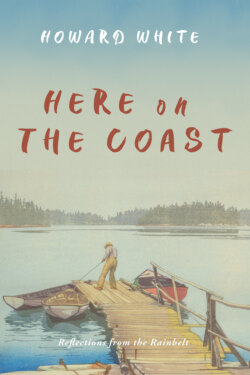Читать книгу Here on the Coast - Howard White - Страница 17
На сайте Литреса книга снята с продажи.
Climate Talk
ОглавлениеBack in 2006 my friends at the office gave me a little Christmas gift consisting of one of those insulated mugs with a plastic slot you can put your own message in. Mine had the message I survived the storms of ’06. The slogan seemed apt at the time because 2006 had been one of the worst years up to that time for winter windstorms and we’d spent almost two weeks without power, spread over half a dozen outages. This was when people first began to be aware something was going on with the weather and there was panicky scare talk that climate change might be coming true a lot faster than we thought. Up until that time I used to kind of laugh when the lights went out. It happened so rarely it brought a welcome shakeup of daily routine.
But this morning the lights blinked and here I was cursing at the top of my lungs. This has gone beyond a joke. I’ve had it with camp-stove coffee and trying to work in the cold with one flickering light bulb, the computer losing its memory every time the generator skips a beat. As a novelty it was tolerable, but as a way of life—it’s the pits.
This morning the lights come back on after five minutes—probably just the guys fixing some jury-rig they put up during the last outage—but you can't help wondering, what happened to that sense of approaching apocalypse we all had when the current run of extreme weather events first started hitting home? More than a decade on, people have stopped talking in such an alarmed way about climate calamities like worst-in-a century flooding, all-time record wildfires and windstorms that have caused a 265 per cent increase in power outages in the past four years according to BC Hydro. But it’s hard to get much of a conversation going about that. It’s become a worn-out topic, like Donald Trump’s millionth lie.
Back in ’06, official BC seemed content to treat that very bad weather year as a one-off. The Vancouver Park Board left one section of the Stanley Park blowdown on the ground as a memorial to that year’s storms, as if never expecting to see the like again. The government used the same kind of thinking on the mountain pine beetle outbreak that destroyed much of what remains of BC’s merchantable timber. The plan has been to clear off all the diseased trees and plant exactly the same species in their place, as if the slowly warming trend that spawned the beetle plague will end any day now and things will normalize over the next eighty years.
Whether you accept the consensus of scientific opinion that changing weather patterns are the result of global warming caused by human pollution or whether you side with the Fraser Institute claim this is just a natural shift like others we’ve had in the past, there is no longer any denying that a shift it is, so we better adjust to it. The Vancouver Park Board should redesign Stanley Park assuming that storms like those of ’06 will be the norm rather than the exception for the foreseeable future. The Ministry of Forests should replant the old lodgepole pine stands with species that can survive warmer winters. And here on the Sunshine Coast, BC Hydro better hire back some of the line crews they laid off over the past fifteen years. But is any of this happening? Year after year the government drastically underestimates the amount they put in the budget to fight wildfires, as if a return to the levels of the 1960s can be expected going forward. And the regular folks who were momentarily panicked by these increasingly scary weather events back in 2006? Rather than becoming ever more concerned, we have become tired of talking about it. Yeah, yeah, another flood in Grand Forks. Those people should just move to higher ground. BC’s world-class glaciers melting much faster than expected? Yawn. We are becoming inured to natural disaster. This may be an even more dangerous attitude than outright climate change denial.
